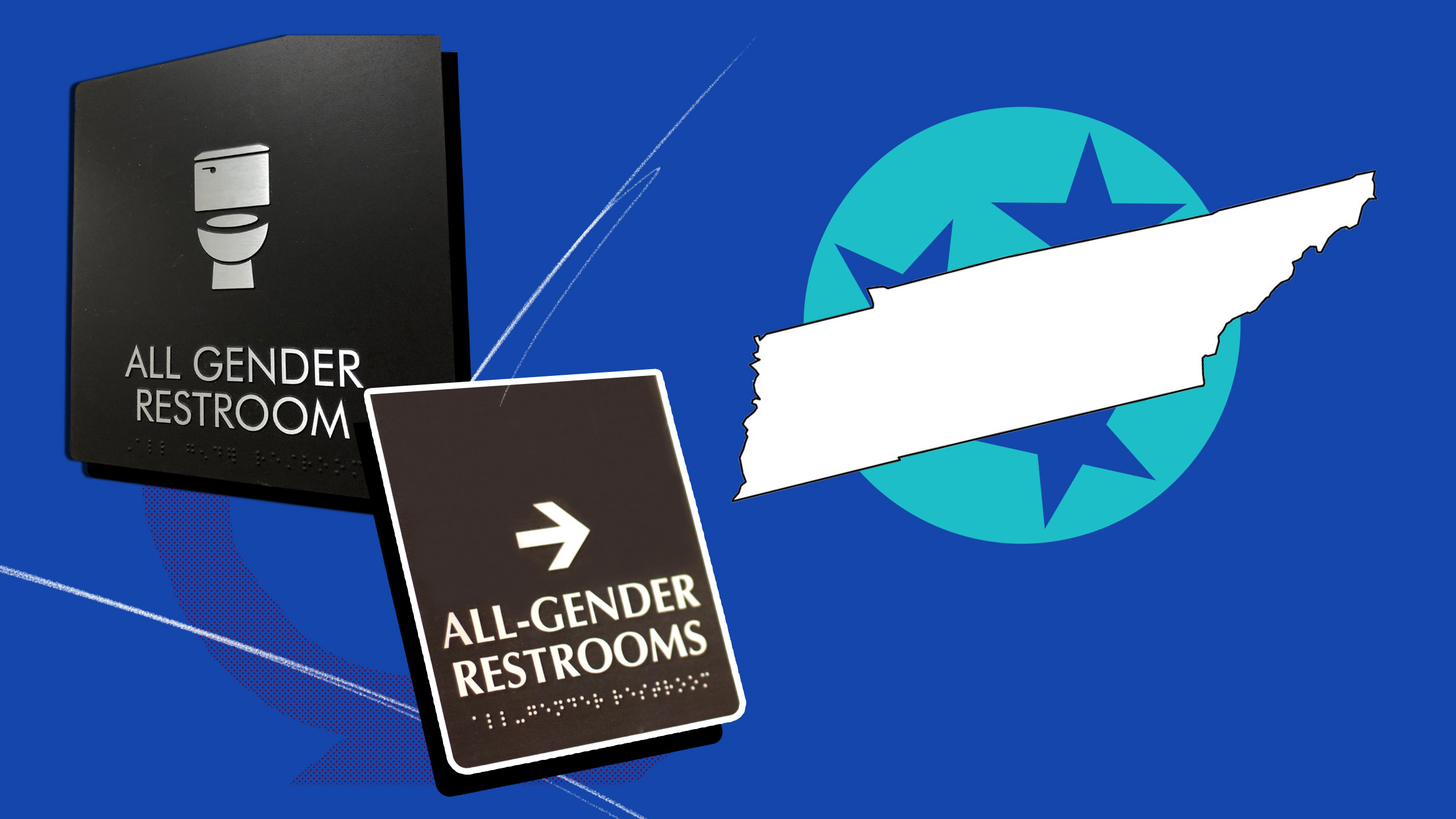Tennessee’s anti-trans bathroom sign law was struck down this week in a blistering court ruling strongly criticizing the first-of-its-kind edict.
In a 40-page ruling issued on May 17, Judge Aleta Trauger said that Tennessee’s House Bill 1182 represents a “brazen attempt to single out trans-inclusive establishments and force them to parrot a message that they reasonably believe would sow fear and misunderstanding.” Signed into law by Republican Gov. Bill Lee last May, the legislation requires businesses that allow trans people to use the restroom that most closely corresponds with their lived gender to hang a sign notifying the public of the policy.
Trauger argued in her decision that the law does not serve a “compelling government interest,” adding that it infringes on business owners’ First Amendment rights by forcing them to convey a message they may not agree with.
“Transgender Tennesseans are real,” she wrote in a ruling before the U.S. District Court for the Middle District of Tennessee. “The businesses and establishments that wish to welcome them are real. And the viewpoints that those individuals and businesses hold are real, even if they differ from the views of some legislators or government officials. While those government officials have considerable power, they have no authority to wish those opposing viewpoints away.”
The district judge took particular issue with how Tennessee lawmakers went about forcing business owners to discriminate. If the law had been allowed to stand, the signs trans-affirming businesses would have been mandated to display would have read: “This facility maintains a policy of allowing the use of restrooms by either biological sex, regardless of the designation on the restroom.”
“Transgender Tennesseans are real. The businesses and establishments that wish to welcome them are real.”
Trauger noted that requirements from the state specified that the message had to be displayed in bold, red text with all-capital letters. She called the specifics of the policy “cartoonishly alarmist.”
“If anything, the uncertainty regarding the act’s enforcement sheds a light on the degree to which the Act functions as a trap that the state can spring at any time on a business that it considers too friendly to its transgender patrons,” she said. “The relevant constitutional question is whether the act compels the plaintiffs to voice a message to which they earnestly object, based upon their disagreement with its content. The undisputed evidence shows that it does.”
The decision marks Trauger’s second time censuring HB 1182. Eight days after the law went into effect last year, she allowed a temporary injunction against its enforcement while a lawsuit against HB 1182 proceeded through the courts.
Opponents of HB 1182 celebrated following Tuesday’s court ruling, which will permanently prevent business owners from being targeted under the law. Had the court allowed Tennessee to punish trans-friendly businesses, any individual who did not comply could face a $500 fine and a class B misdemeanour, the latter of which entails a sentence of up to six months in jail.
The American Civil Liberties Union (ACLU) of Tennessee, which joined the national ACLU last year in the filing of a lawsuit against the bill, said the decision ensures businesses that welcome trans people “are not forced to become instruments for politicians’ discrimination.”
“Transgender individuals should be able to live their lives free of harassment and discrimination,” said Hedy Weinberg, executive director of the ACLU of Tennessee, in a statement.
The lawsuit was filed on behalf of several Tennessee businesses owned and frequented by trans people. Bob Bernstein, owner of the Nashville café Fido and a plaintiff in the case, said that he didn’t want his trans customers to “have to feel uncomfortable or attacked just because they want to use the bathroom.”
“We have customers, employees, friends and family in the community, and we wanted to show our support,” Bernstein tells Xtra. “This is no different than supporting any other community.”
Kye Sayers, who was originally attached to the lawsuit when it was filed last year, says that HB 1182 doubly impacted her both as a trans woman and a business owner. Sayers is the founder and CEO of Sanctuary Cafe and Performing Arts, a coffeehouse in Chattanooga that offers an all-too-rare safe space for members of the LGBTQ2S+ community in the U.S. South.
When the law was enacted last year, Sayers says she felt “fear, guilt and embarrassment for potentially having to allow the signs or face punishment.” It put her in a difficult position: several LGBTQ2S+ customers told her they would be forced to stop coming if Sanctuary were forced to display messages making them feel unwelcome.
“It may seem small and insignificant to others, but to them it was shameful and embarrassing,” she tells Xtra. “They would constantly be reminded that they were a problem or target.”
While business owners opposed to HB 1182 may have breathed a sigh of relief this week, the fight may not be over yet. The state of Tennessee still has the opportunity to appeal the decision and could take the case as high as the U.S. Supreme Court. Supporters of the law have claimed without evidence that it is necessary to prevent women and children from being targeted by sexual predators while accessing public spaces.
Tennessee lawmakers have also pushed several other proposals targeting queer and trans people. After Lee signed five anti-LGBTQ2S+ bills last year, he rubber-stamped legislation in April ramping up punishments for schools that allow trans athletes to compete in sports according to their gender identity.
Opponents say they will do what it takes to make sure HB 1182 isn’t allowed to harm a community that already faces intense scrutiny from state politicians.
“I’m Jewish by faith and culture,” Bernstein says. “Sometimes when I see things, I just substitute different words and different communities. How would you feel if this was Jewish people or African-American people? It’s ridiculous. Our constitution guarantees rights for all, except for when the government decides not to.”


 Why you can trust Xtra
Why you can trust Xtra


